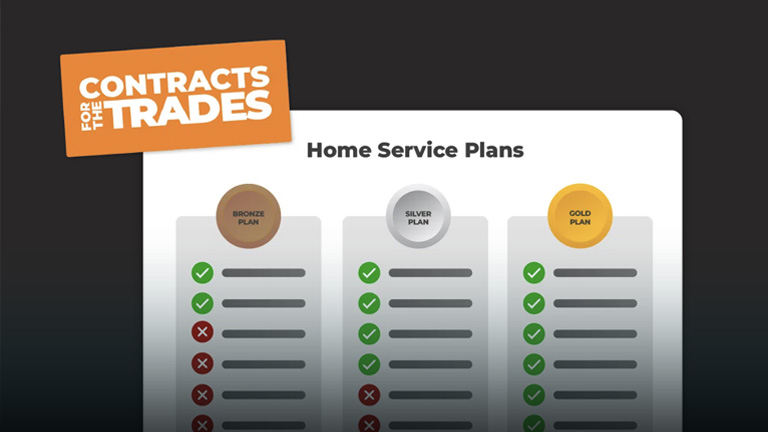What Is Contract Management? Contracts for Trade Services
February 28, 2024 | Read: 12 minutes

“What is contract management?” If you’re asking, it may be that you’re not yet making the most of contracts in your field service business.
But to help you, we’ve explored everything you need to know about contract management, right here
If you’re not fully using contracts, we’ll cover how you can begin to take advantage of them to generate recurring revenue, and more, too.
Using contracts is fast becoming the standard for businesses in the field service industry.
It’s unsurprising when you find that they’re beneficial for:
- Creating recurring revenue
- Giving customers peace of mind
- Keeping you busy during quieter seasons
These are just a few of the core benefits that plumbing, gas, and electrical maintenance businesses can enjoy.
If you have engineers carrying out routine service and maintenance repairs, then contract management—especially when it’s powered by planned maintenance software tools—can help you take your service business to the next level.
Let’s dive in and explore more of what you need to know.

What is Contract Management?
Contract management is, quite simply, how your company oversees and manages the service agreements you have with your customers.
Traditionally, many field service businesses will make use of paper contracts, and while many now use digital documents (think PDFs via Adobe and DocuSign), it doesn’t make actually organising these documents easier.
That goes the same for managing the responsibilities and jobs that come with contract, too.
Whether you’re using a physical filing system or trying to keep things organised on a computer, it’s only by using an all-in-one contract management system that you’ll find contract management more efficient and beneficial for your business.
If you’re looking to effectively manage service agreements as a trade or field service business, you need a performance monitoring system that handles the backend processing, analytics, and reporting on its own and notifies/alerts you about changes and priorities to help you rise to the occasion.
Max Wesman, Founder and COO at GoodHire
We’ll explore more about why this is the case, below:
What is a Maintenance Contract?
Let’s continue by looking at the typical type of contracts you manage: for customers at home.
When it comes to residential customers, you’ll likely have a team of engineers who take care of a physical asset in the customer’s home—like a boiler or a fire alarm system—by giving them a regular check-up.
A maintenance contract—sometimes also called a service contract or maintenance agreement—is a legally binding arrangement between service provider and customer. These contracts typically outline the terms and conditions of the service you provide. It could be for ongoing maintenance or other services that you’ve promised to cover.
Generally speaking, a field service contract is designed to:
- Outline the scope of services. This includes response times, the number of scheduled maintenance visits, exclusions, and legal terms & conditions of the contract.
- Provide a clear framework for service providers and customers to reference when working together.
- Ensure businesses actively monitor and address equipment issues to ensure optimal performance.
Of course, it’s likely that you’re dealing with hundreds, if not thousands of customers. Managing a contract (or contracts) for each and every one of them can get complicated and time-consuming. That’s especially true if you’re not using the right tools, or are hiring a small army to oversee them.
You need a more efficient solution.
Fortunately, with the right contract management software, organising your maintenance contracts can be much easier.
The best tools will even allow you to customise and manage contracts. With these tools, you can cater to specific equipment types, different industries, and a wide variety of customer needs.
What is the Importance of Contracts?
While one-off jobs are great for the company, it can be hard to predict the future if your schedule isn’t already full.
Perhaps the most significant reason for using maintenance contracts, especially as a growing service business catering to customers at home, is that it’s the fastest way to secure recurring revenue and keep your business busy.
With contracted payments, you can be more sure of the money you’re bringing regular income (monthly and annually) and be more decisive about how to grow your business.
Beyond just managing your customer’s needs, managing contracts will give you the ability to predict, track, and improve your overall operations.
In this way, clarity and efficiency matter for you and your customer alike!
It’s about being as transparent as possible regarding what the service covers, any exclusions, response times, and costs.
Nyokabi Mickensm, CEO
Additionally, by building a relationship with your customers, you’ll position yourself to win more opportunities down the line.
After all, when you proactively provide a solution to meet their present needs, you’re showing that you’re capable of helping them in the future, too.
If this sounds like a great reason to start using contracts, then rest assured that a maintenance contract can help you stand out from your competition. Use them secure revenue so that you can thrive in a competitive market!
3 Big Benefits of Maintenance Contracts:
Aside from generating recurring revenue, here are three more great reasons why trade businesses should strive to get more of their customer base signed up for monthly or annual service maintenance contracts:
1. Improved Customer Service and Loyalty
As we touched on in the introduction, a formal contract between service provider and customer provides peace of mind. This is what any home or business owner is seeking when they think about the upkeep of their house or flat, or repairs that may be needed at different properties, like a shop or warehouse.
If your company is set up with the right tools and you’re confident that you can deliver on the contracts you’re offering, word will get out about how great it is to work with your business.
Paired with the right customer self-service software, your customer can have around-the-clock access to the information and services they signed up for. This creates an additional opportunity to build long-term customer relationships that will use your services for many years to come and can help with your service reminder strategy, too.
2. Better Budgeting
If you’re looking to grow your business, you should have a deep understanding of your finances already, but it’s paramount if you’re growing via contracts.
An article from Forbes stated:
“If you’re lost when it comes to proper accounting and business funds or resource management, you might find yourself unable to invest in or grow your business.”
Due to the increasing scale and complexity of managing contracts, you’ll need to accurately calculate your revenue, ideally using software.
In this way, as you secure an increasing amount of contracts, you can calculate your recurring revenue and organise how you get paid, order and manage parts, and make chasing non-paying customers much more straightforward.
With a great budget and job management systems in place, you’re already in a position to scale your operations, take on a higher volume of jobs, and potentially expand into new markets.
3. Extended Product Lifespans
Waiting until something breaks to get it serviced isn’t a logical option for the loyal customer base that needs consistency in their life.
Having the ability to monitor live equipment and provide upkeep for customers before it’s too late will help you maintain a strong working relationship and keep them coming back to your business.
When your products get the regular service they need (thanks to your service maintenance agreements) you’ll be able to extend their lifespan and save your customers even more money in the long run.
On top of that, you’ll build a priceless trust with customers and they’ll always know they can turn to your business with any additional work they need done.
How to Create and Manage a Service Contract
Crafting an effective service maintenance agreement requires a thorough understanding of your customer’s needs and a strategic approach to addressing potential challenges.
The five sections below will help guide you in the right direction when creating a field service maintenance contract:
1. Finding the Right Price
Finding the right price for your services can be a challenge. You have to think about your bottom line, the demographics of your market, and your competitors’ prices.
We’ve found that utilising a good, better, best pricing strategy is an inclusive way to provide your services to the widest possible audience.
Offering customisable service options or tiered packages allows businesses to cater to a wider range of customer needs and preferences. [It can position your] business as a forward-thinking and customer-centric brand
Nyokabi Mickensm, CEO
The more data you collect and analyse with your software, the easier it becomes to find the perfect price point for your products and services.
For more, explore our blog: “How Much Should I Charge Per Hour?”
2. Assessing Your Customer’s Needs
Understanding the specific requirements and expectations of your customer as a whole can be tricky.
Sometimes there might even be a customer that won’t be a good fit for a maintenance contract.
For example: if you have a customer that is constantly calling engineers out to their property for unnecessary or low-cost work, you could end up spending more on travel and labour than the profit a maintenance agreement can bring in.
Once you fully understand the general needs of your customer base, designing a contract that meets their desires becomes much simpler. This approach can even impact how you create a good, better, best pricing system with tiered options giving greater perks. for instance, the Bronze Tier includes 2 callouts, Silver includes 3, Gold provides 5, each at increasing price.
To help you shape your own contracts and conditions, try thinking about the length of the policy that your customer would be most willing to commit to and what assets you might be servicing, too.
3. Scope of Services
Deciding which of your services are included under your field service maintenance agreements should be driven by your budget and product costs.
You’ll have to clearly define the services included in the agreement, such as routine maintenance, emergency repairs, or even software updates.
There’s always room for negotiation within a contract on an individual basis.
However, the accessible services and the frequency outlined in the contract should be the same for everyone under their tier of payment plan (even if you have more than one pricing model).
4. Renewal Policies
Unless you’ve won the lottery, nobody likes to be surprised by a sudden expense (and even then).
As far as contracts are concerned, this includes when a contract subscription unexpectedly renews.
Include your renewal policy within the service contract and make it a point to clearly explain to customers how a renewal works.
If you choose to automatically renew your customer in your service, you’ll need to have a system that notifies them with enough time, so that they can cancel if they would like to.
If you’re doing this manually, you’ll know that this is a time-consuming process.
That’s where having automated alerts and notifications built into the contract management software can be a massive help, as Hailey Harris, Business Development Manager, License Lookup points out:
Automation can reduce administrative overhead, minimise errors, and improve overall efficiency.
You’ll eliminate the worries related to chasing down signatures and easily stay on top of contract renewals.
5. Terms and Conditions
With any legally binding document, it’s best to have a lawyer review the maintenance agreement or contract before finding customers to participate.
Providing terms and conditions that comply with state and federal regulations is a must if you want to avoid lawsuits.
Don’t forget to take the time and learn about each customer before signing them to an extended contract or service agreement.
While contract management software won’t help you write legal terms and conditions, it’s important to:
“Ensure that your service agreements are legally sound and compliant with both local and international regulations. [Remember to] consult with a legal expert specialised in trade services to tailor your contracts accordingly.”
Hailey Harris, Business Development Manager, License Lookup
Keep it simple: How to Write a Quote for a Job (and sell more!)
Training Field Service Engineers to Upsell
While you shouldn’t expect your field service engineers to be the best salespeople on the market, they should have a solid understanding of the fundamentals.
Since engineers are regularly face-to-face with customers and already have full knowledge of the maintenance agreements, they are the best ones to upsell an existing customer on a recurring contract.
Waiting till something needs repairs and neglecting regular service on your equipment or home can become much more costly.
Having your techs break down the monthly costs for your recurring service compared to the costs of not having it over time is one way to sell customers on the need for a maintenance contract.
As the manager, having an impactful new hire training program and providing regular feedback as field engineers grow in their careers will give them the confidence they need to help you build an overflowing revenue stream.
What is Contract Management? It’s better with Commusoft!
Commusoft offers a state of the art service contract management software. All the structure your team needs is provided, you just need to input your terms and let the software do the rest!
To help centralise your business, our job management software can easily integrate with your current payment, accounting, and communication systems to make the transition straightforward and worthwhile.
Just like your customers get peace of mind by having a service contract, you’ll get peace of mind for your business by knowing you have an easily manageable recurring revenue source.
Follow the link for more information on Commusoft’s field service management software.









